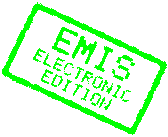Cycle Action on Treelike Structures
Daniele A. Gewurz
and Francesca Merola
Dipartimento di Matematica Università di Roma “La Sapienza” Piazzale Aldo Moro, 2 00185 Roma Italy
DOI: 10.1007/s10801-005-7395-x
Abstract
The purpose of this paper is to study the action on cycles of several known classes of oligomorphic groups, that is, infinite permutation groups of countable degree having only finitely many orbits on k-sets for each k. The groups studied here are all related to trees and treelike relational structures. The sequence whose k-th term is the number of orbits in the action on k-cycles is called Parker sequence. It turns out that, if we are dealing with the automorphism group of a suitable relational structure, this sequence counts also the finite substructures admitting a cyclic automorphism; in calculating these sequences for various groups, we shall thus describe and enumerate such substructures.
Di più dirò: ch'a gli alberi dà vita [I shall say more: the trees are given life spirito uman che sente e che ragiona. by a human spirit that perceives and reasons.
Pages: 105–114
Keywords: keywords oligomorphic permutation groups; action on cycles; circulant relational structures; trees
Full Text: PDF
References
1. P.J. Cameron, “Some treelike objects,” Quart. J. Math. Oxford 38(2) (1987), 155-183.
2. P.J. Cameron, Oligomorphic Permutation Groups, LMS Lecture Notes 152, Cambridge Univ. Press, Cambridge, 1990.
3. J. Covington, “A universal structure for N -free graphs,” Proc. London Math. Soc. 58(3) (1989), 1-16.
4. D.A. Gewurz, “Parker vectors and cycle indices of permutation groups,” Quaderni Elettronici del Seminario di Geometria Combinatoria 4E (2002) [http://www.mat.uniroma1.it/~combinat/ quaderni].
5. D.A. Gewurz and F. Merola, “Parker vectors for infinite groups,” Europ. J. Combin. 22 (2001), 1065-1073.
6. D.A. Gewurz and F. Merola, “Sequences realised as Parker vectors of oligomorphic permutation groups,” Journal of Integer Sequences 6 (2003), Article 03.1.6 (electronic) [http://www. math.uwaterloo.ca/JIS/].
7. D.E. Knuth, Axioms and Hulls, Lecture Notes in Computer Science 606, Springer-Verlag, Heidelberg, 1992.
8. H.D. Macpherson, “Orbits of infinite permutation groups,” Proc. London Math. Soc. 51(3) (1985), 246-284.
9. F. Merola, “Orbits on n-tuples for infinite permutation groups,” European J. Combin. 22 (2001), 225-241.
10. N.J.A. Sloane (Ed.), The On-Line Encyclopedia of Integer Sequences, published electronically at
2. P.J. Cameron, Oligomorphic Permutation Groups, LMS Lecture Notes 152, Cambridge Univ. Press, Cambridge, 1990.
3. J. Covington, “A universal structure for N -free graphs,” Proc. London Math. Soc. 58(3) (1989), 1-16.
4. D.A. Gewurz, “Parker vectors and cycle indices of permutation groups,” Quaderni Elettronici del Seminario di Geometria Combinatoria 4E (2002) [http://www.mat.uniroma1.it/~combinat/ quaderni].
5. D.A. Gewurz and F. Merola, “Parker vectors for infinite groups,” Europ. J. Combin. 22 (2001), 1065-1073.
6. D.A. Gewurz and F. Merola, “Sequences realised as Parker vectors of oligomorphic permutation groups,” Journal of Integer Sequences 6 (2003), Article 03.1.6 (electronic) [http://www. math.uwaterloo.ca/JIS/].
7. D.E. Knuth, Axioms and Hulls, Lecture Notes in Computer Science 606, Springer-Verlag, Heidelberg, 1992.
8. H.D. Macpherson, “Orbits of infinite permutation groups,” Proc. London Math. Soc. 51(3) (1985), 246-284.
9. F. Merola, “Orbits on n-tuples for infinite permutation groups,” European J. Combin. 22 (2001), 225-241.
10. N.J.A. Sloane (Ed.), The On-Line Encyclopedia of Integer Sequences, published electronically at
© 1992–2009 Journal of Algebraic Combinatorics
©
2012 FIZ Karlsruhe /
Zentralblatt MATH for the EMIS Electronic Edition
